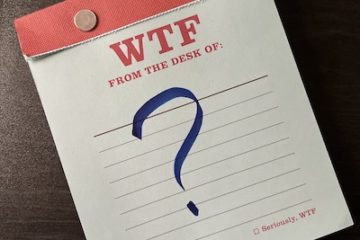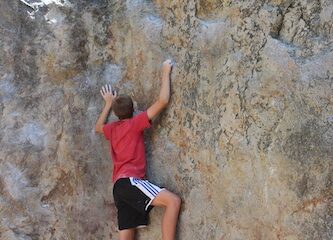How not to fall off the identity cliff
People fall off the identity cliff when they have reached a key milestone in life or achieved a main goal with no plan for what comes next. It happens when you tie your entire identity too closely to your current role.
It’s kind of like with superheroes in comic books—there must always be a villain to defeat, for what is a superhero without a villain?
My guess is the readers of this blog are not superheroes, at least not in the comic book sense. But every one of us may fall off the identity cliff if we tie our identity too closely to a role we are filling.
Many roles turn into identities
We all have different roles at different times in our lives. Child, spouse, employee, parent, manager, caregiver, etc.
Some of these roles gain such power that we tie our identity to the role itself.
There was the 74-year-old man who kept putting off retirement because he had no concept of who he might be when he stopped being someone’s employee.
There was the dad who worried that when his youngest daughter went to college, he and his wife would just stare silently across the table at each other with nothing to talk about.
There are people I’ve met who fall so deeply into caregiving for a loved one that they lose all sense of self. They’re Samwise Gamgee, the sidekick in their loved one’s heroic drama.
And there was me, 28 years married at 50 years old, for the first time figuring out what it would be like to change from husband to divorcee as I also needed to flee a toxic workplace and was readying to launch my kids into adulthood.
We were all standing at the edge of the identity cliff, looking down into the abyss.

Is the identity cliff an inevitability?
Change is inevitable.
At some point, the role you’re in will end. Parents become empty-nesters. Employees may become managers or retirees. Single people may become spouses. A spouse may become a divorcee or a widow(er). A caregiver may become a… former caregiver? Bereaved person?
Change happens. Sometimes dramatic change comes with clear rites of passage—moving out on your own, or reciting wedding vows, signing divorce papers, holding a retirement party, the death of the loved one you’ve been caregiving.
Sometimes change occurs over time, like the proverbial frog in the pot of heating water. This might be intentional change, or it might be imposed upon you, or it might be lifestyle creep.
Successfully thriving through these identity changes is possible, even the ones that sound devastating.
One of the key aspects of having that resilience is to make sure you don’t fall off the identity cliff during the change.
Identity resilience leads to confidence and peace
An important part of resilience is identity resilience. Loosely stated, I am defining identity resilience here as a stable understanding of who you are based on self-awareness, self-esteem, self-actualization, and self-affirmation.
There’s a lot of selfs in that paragraph. That’s on purpose.
You’ll notice, however, that I didn’t include role in in my definition.
Role is your function, not who you are. Relationships are who you surround yourself with, not who you are. Wealth is what you own, not who you are. Activities are what you do, not who you are. Goals are what you strive for, not who you are.
Who you are is a combination of your beliefs, your values, your strengths, your fears, your weaknesses, and all the other things that make you uniquely you. That’s your core identity.
if you’re lucky, your core identity and your assumed identity are closely aligned.
Most of us take on assumed identities, at least at times in our lives, that do not align with our core identy.
In our culture of consumerism, comparison, achievement, and tribalism, most of us never have the emotional or mental space to articulate our core identity, to consider who we really are underneath all the external messages telling us where we fit in and how we should behave.
We end up in a constant state of stressful ambivalence rather than a state of confidence and peace.
Three steps to avoiding the identity cliff
Don’t expect a personality test to give you clear, prescriptive answers. As much as I like to say that we each have a core identity, the truth is that life changes us in fundamental ways, not just superficial ways.
The act of measuring something can change that thing. That is, when you learn a little about yourself, you may make changes that then later teach you new things about yourself.
Additionally, we all exist within undeniable context. Caregivers have a caregiver role because life has served that to them. Some workplaces turn toxic. Layoffs happen. It’s not always possible to live every minute aligned with your core identity. It’s complicated.
All that said, here are three simple things you can do to begin better understanding yourself, and to give yourself the tools and capability to continue refining that understanding over time.
1. Articulate your core values
I have my own flavor of a core values exercise. You can find hundreds of others on the web for free. The key in this is to try to strip away all the external influences and messages telling you who you should be and come up with an idea of who you are. Those might be the same. they might not. Learn what you learn.
2. Do a strengths assessment
it really doesn’t matter which one you choose so long as you don’t take it as prescriptive. Look at what it tells you with an open but skeptical mind. Which parts of it feel right to you? Which feel wrong? Why do those parts feel right or wrong? What evidence from your past can you point to that shows those parts as correct or incorrect? The power of a strengths assessment is not in what it tells you, but in how it changes or reiforces your self-perception.
3. Begin a practice of self-reflection
Journaling every day, even a few minutes, can be a powerful way to work on self-awareness. It can backfire, though, as it did for me during one difficult part of my life. You want it to be a learning and growth opportunity, not a routine that simply entrenches existing patterns and habits. The point is to build your identity resilience, not create a rigid sense of self.
Sign up for a free coaching consultation
Looking to be a better leader? Contemplating a career change? Struggling with a big life question? Want to write or publish a book? Thinking about retirement? I can help. Schedule a free coaching session now.
Get my core values exercise free
This simple worksheet helps identify your core values. Many of my clients find it surprisingly eye-opening, and it’s helped people make some big life decisions. Get it here.



0 Comments